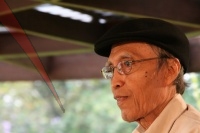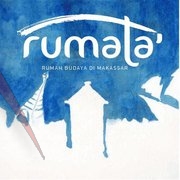Writing the Truth — Fact or Fiction
July 3, 2011
We were fortunate to have four touring writers from the Netherlands,Turkey, Egypt and the US together with five Malaysian writers during the recent Writers Unlimited TourKL/Makassar 2011. Umapagan Ampikaipagan moderated a panel discussion during the tour. He walks us through the provocative theme Writing Truth —Fact or Fiction. How fiction helps us get to the truth and how fact can sometimes fictionalise truth.
—
(post taken from Dot Dot Dot)
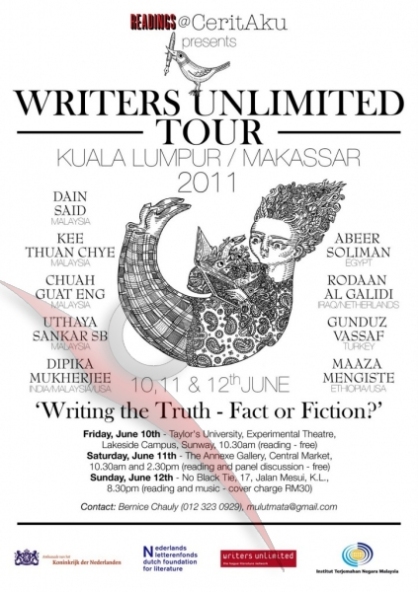 Connecting writers with each other and with audiences, across borders of cultures and countries. That is the mission of Writers Unlimited (formerly known as Winternachten), the international literature festival. In an annual event in The Hague, and in tours across the world, Writers Unlimited brings together writers and poets. During those encounters, they exchange – before an audience and amongst each other – their literary work, their experiences, dreams and ideas. In all langagues and in all their cultural diversity.
Connecting writers with each other and with audiences, across borders of cultures and countries. That is the mission of Writers Unlimited (formerly known as Winternachten), the international literature festival. In an annual event in The Hague, and in tours across the world, Writers Unlimited brings together writers and poets. During those encounters, they exchange – before an audience and amongst each other – their literary work, their experiences, dreams and ideas. In all langagues and in all their cultural diversity.
From 9 to 17 June, four authors will travel with us in a combined tour to Indonesia and Malaysia: Writer and columnist Gündüz Vassaf from Turkey, poet Rodaan Al Galidi from The Netherlands, writer and storytaller Abeer Soliman from Egypt, and writer Maaza Mengiste from Ethiopia/USA.
In Malaysia we perform in Kuala Lumpur, for a general audience and for students. Our partner in Kuala Lumpur is the writer Bernice Chauly, who last year joined us in tours to Cape Town, Suriname and the Antilles. She inivted four authors from Malaysia to perform together with our writers: Dain Said, Kee Thuan Chye, Chuah Guat Eng, Uthara Sankar SB and the Indian writer Dipika Mukherjee.
From Kuala Lumpur we fly to Makassar, on the island of Sulawesi, Indonesia. Here we co-operate with the newly opened cultural center Rumata Art Space. The director, writer Liy Yuianti Farid was one of our participating writers in the January 2011 festival in The Hague. Our four writers will perform in Makassar with local writers and poets: Shinta Februiany, Hendra Gunawan ST, Erni Aladjai and Hamran Sunu, and the renowned poet Sapardi. We will perform not only in Makassar, but also for school pupils in the village of Galesong, and for the local community on the island of Barranglompo.
During the performances, all the authors will read from their work in the original language. Translations into English and/or Indonesian will be projected simultaneously.
The Program:
Reading at Taylor’s University – Kuala Lumpur
The first performance in this tour is in Kuala Lumpur in the Experimental Theatre in Taylor’s University. The writers will read from their work, and talk with the students and other visitors. The four writers invited by Writers Unlimited – Gündüz Vassaf (Turkey), Maaza Mengiste (Ethiopia/USA), Abeer Soliman (Egypt) and Rodaan al Galidi (Netherlands/Iraq) – will perform together with the Malaysian authors Dain Said, Kee Thuan Chye, Chua Guet Eng, Uthara Sankar SB and the Indian writer Dipika Mukherjee. All writers will read in their own language, and their texts will simultaneously be projected on screen in English translation. Admission is free.
Taylor’s University – Experimental Theatre – Kuala Lumpur – Fr 10 Jun – 10.30 hrs
Opening programme – Kuala Lumpur
The opening programma in The Annexe Gallery in Kuala Lumpur consists of readings by the authors, and a panel discussion. Part one stars at 10.3am, part two at 2.30pm. Admission is free. The four writers invited by Writers Unlimited will participate: Gündüz Vassaf (Turkey), Maaza Mengiste (Ethiopia/USA), Abeer Soliman (Egypt) and Rodaan al Galidi (Netherlands/Iraq). They will perform together with the Malaysian authors Dain Said, Kee Thuan Chye, Chua Guet Eng, Uthara Sankar SB and the Indian writer Dipika Mukherjee. The discussions are moderated by the Malaysian writers Amir Muhammad and Umpagan Ampikaipakan. Admission is free.
Annexe Gallery, Kuala Lumpur – Sa 11 Jun – 10.00 hrs
Readings and music – Kuala Lumpur
An evening with reading and music. Eight writers will read from their work in the original language. English translations will be projected on screen simultaneously. With Gündüz Vassaf (Turkey), Maaza Mengiste (Ethiopia/USA), Abeer Soliman (Egypt) and Rodaan al Galidi (Netherlands/Iraq), Dain Said (Malaysia), Kee Thuan Chye (Malaysia), Chua Guet Eng (Malaysia), Uthara Sankar SB (Malaysia) en Dipika Mukherjee (India). Writer Bernice Chauly is the MC. Venue: ‘No Black Tie’, 17, Jalan Mesui, Kuala Lumpur.
No Black Tie, Kuala Lumpur – Su 12 Jun – 20.30 hrs
Cover charge RM 30
Opening Makassar International Writers Festival 2011
The opening night of the festival. With a short movie screening of ‘Tribute to Mohammad Salim’. Salim is the translator of the classical maniscript of ‘I La Galico’. The distinguished poet Sapardi Djoko Damono will perform this evening. Rodaan al Galidi will read from the classical manuscript, together with three Indonesian poems. Detailed programme will follow soon.
Tickets: Limited seat, contact eventrumata@gmail.com.
Rumata’ Art Space, Makassar, Indonesia – Tu 14 Jun – 19.00 hrs
Writing in the Era of the New Media – Makassar
A programme with Abeer Soliman (Egypt), Tinrity The Naked Traveler (Indonesia) and others. Detailed information will follow soon.
Rumata’ Art Space, Makassar, Indonesia – Th 16 Jun – 16.00 hrs
The United Nations of Fish
‘The United Nations of Fish, A Fundraising Dinner’. Writers read from their work during dinner, as a fundraising event for the newly opened Rumata Art Space. The evening is organised together with Janet deNeefe, director of the Bali book festival. The four writers on tour for Writers Unlimited will perform together with ’Aisha the little chef’, Sese Lawing and local poets. Ticket price is Rp 200,000, to be purchased via eventrumata@gmail.com.
Rumata’ Art Space, Makassar, Indonesia – Th 16 Jun – 19.00 hrs
For more information go to the website of Writers Unlimited.
—
(post taken from: Latitudes.nu | Writers Unlimited — Writers Tour to Indonesia and Malaysia)
Truth in fiction by Daphne Lee
July 3, 2011
A recent gathering of authors elicits descriptions like ‘inspiring’ and ‘entertaining’.
IT’S been several years since Kuala Lumpur played host to a literary festival, so the city’s book lovers were understandably excited when Malaysian writer and poet Bernice Chauly announced the Writers Unlimited Tour KL/Makassar 2011 a couple of months ago.
At the time, there was some doubt whether the festival would happen as the organisers were having problems raising the necessary funds (a common problem faced by arts and literature groups all over the world). Fortunately, Chauly’s appeal for RM22,000 was met in the nick of time by the Embassy of the Kingdom of the Netherlands and Institut Terjemahan Negara Malaysia.
The event was jointly organised by Writers Unlimited and Readings@CeritAku. Writers Unlimited, formerly known as Winternachten, is an initiative that organises an annual international literature festival in The Hague, as well as literary events abroad, in cooperation with local partner organisations. Readings@CeritAku is Chauly’s creation, a showcase (held at KL café-bar No Black Tie) for Malaysian writers, and a continuation of Readings, the platform for published and unpublished writers that was started by book blogger Sharon Bakar and that is now a monthly event in the Klang Valley.
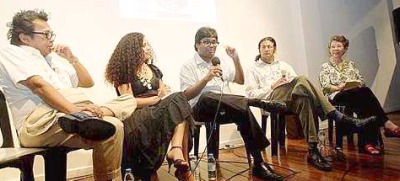
Going great guns: The afternoon session at the Writers Unlimited event featured moderator Umapagan Ampikaipakan (with mic) and writers (from left) Dain Said, Abeer Soliman, Rodaan Al Galidi, and Chua Guat Eng.
Chauly met Writers Unlimited director Ton van de Langkruis at the UtanKayu Literary Biennale in Jakarta back in 2009 and through him became part of the touring festival. She is the first Malaysian to have toured with them and this is the first time the festival has come to Malaysia.
The festival in KL lasted for three days and comprised readings at Taylor’s University, readings and panel discussions at the Annexe Gallery, and more readings at No Black Tie.
I attended the readings and panel discussions on the second day of the festival and was inspired as well as thoroughly entertained by what I heard. The Annexe Gallery at Central Market was an ideal venue for these sessions, being small enough to create a sense of intimacy between the writers and the audience.
Two sessions split the nine featured writers into two groups. Gündüz Vassaf (Turkey), Maaza Mengiste (Ethiopia/US), Dipika Mukherjee, Uthaya Sankar S.B., and Kee Thuan Chye appeared in the morning, while Rodaan Al Galidi (Iraq/Netherlands), Abeer Soliman (Egypt), Chua Guat Eng and Dain Said appeared after lunch.
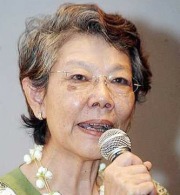
Chua Guat Eng: Fiction allows her to explore things, and leave them in a state that allows further exploration.
The writers read published and unpublished works, and then answered questions posed by sessions’ moderators Amir Muhammad and Umapagan Ampikaipakan as well as the audience.
Central to the discussions was the idea of how the truth may be presented in various ways. This was in keeping with the festival’s theme, Writing The Truth – Fact Or Fiction?, which was decided jointly by van de Langkruis and Chauly.
Said Chauly at a later interview, “I wanted to work with a theme that would resonate with readers, writers and audiences here. Issues like religion, identity, nationality, conflict, corruption are issues that we deal with along with people in many parts of the world. And so we began working on the theme which would deal with writing and truth.”
The blurred lines between fact and fiction are what Chauly is more than familiar with. Her most recent collection of poetry, The Book Of Sins, is a deeply personal and painfully truthful exploration of life, love, death and disappointment, while her latest work, Growing Up With Ghosts (to be published by Matahari Books in August), is a fictive memoir based on her Chinese-Punjabi family’s history.
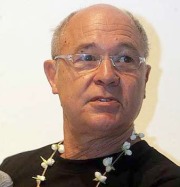
Gündüz Vassaf: Writers should avoid dealing with only their own truth and view themselves and their beliefs with a critical eye, questioning them constantly.
Unfortunately, she did not read from her work at the sessions I attended. However, the featured writers I did hear presented richly diverse material in a variety of voices and styles, all reflecting their lives, their experiences and the places they’re from. Based on truth, the work was written and presented as fiction.
Maaza Mengiste said, “Fiction gives us breathing room – gives our imagination room to play and helps us fill the gaps left by memory.”
Her novel, Beneath The Lion’s Gaze, is set in the 1970s and describes life in Ethiopia under the repressive and cruel Derg regime.
“Writers confront the facts,” she said, “but fiction allows us to get into people’s hearts – it’s a more visceral connection. If writers remain silent we have lost everything.”
Mengiste and the other visiting writers showed how fiction is used to explore reality. Abeer Soliman, whose blog and book (Diary Of An Old Spinster) deal with the problems single women face in Egypt, spoke about how literature is used by writers in the Arab world to “run from restrictions”. She described how a certain writer got around the impossibility of writing about religion by depicting god as a mysterious and powerful man. “Reality is more surprising than fiction but we can use fiction to manoeuvre around the truth.”
I was incredibly moved by the work read by Soliman, Mengiste and Al Galidi. Al Galidi’s poems I found especially affecting. They are based on his experiences as an Iraqi refugee in The Netherlands, and, in translation (Al Galidi performed, with panache, the pieces in their original Dutch, but English versions were projected on to the wall behind him), the nonchalance, whimsy and wry humour of the pieces underline all the more the bitter irony of the situations they describe.
I had a less favourable reaction to Dipika Mukherjee’s reading of the prologue of her soon-to-be published novel Thunder Demons. The piece describes the murder of a beautiful young Tibetan woman at the behest of a corrupt Malaysian politician and sounded to me more like gossipy reportage than creative fiction.
While I don’t deny the importance of writing about controversial events and “outing” leaders guilty of committing atrocities, I feel that there is no merit in simply presenting the same “facts” as discussed in coffee shops and taxis up and down the country. Sorry, but a bunch of adjectives and fictitious names doesn’t make it good fiction.
I would much prefer our country’s troubles and foibles be explored through the depiction of how they have impacted ordinary Malaysians. Perhaps Mukherjee’s book goes on to do this and if so, the prologue is misleading.
Chua Guat Eng, in answer to a question on why writers choose to write fiction, said that this was a form that allowed her to explore things and leave them in a state that allows for further exploration. It seems to me that this approach helps a writer avoid the pitfalls of preaching just one view point, thus coming across as didactic.
To avoid didacticism, Gündüz Vassaf advised writers to avoid dealing with only one truth – their own. He stressed the need to view oneself and one’s beliefs with a critical eye, questioning them constantly.
Kee Thuan Chye read an amusing story that left no one in doubt about his politics. He has always worn his heart on his sleeve in any case, and is admirably forthright in his articles for online news sites MalaysiaKini and Malaysian Digest. I think he has the potential to create powerful and affecting fiction. But first, he needs to stop writing stories as though they are op-ed pieces. (Kee was an associate editor at The Star and also editor of the paper’s Mind Our English column.)
One of my favourite stories from the sessions was Uthaya Sankar S.B.’s Cat, an absurdist tale of a multi-lingual feline who learns that the most successful civil servants are seen, not heard.
The story ends with Uthaya stating his point rather too plainly, but at least the rest of the story manages not to suggest that Malaysians are unable to draw conclusions without the aid of an instruction manual. And I have to say, the writer’s deadpan expression leads me to believe he would do well as a stand-up comedian.
I left the sessions wishing there were more such events to look forward to. When I e-mailed Chauly to ask if Writers Unlimited would be back, she replied, “Writers Unlimited has had its share of budget cuts in the arts and there is a real possibility that they will lose their funding for these tours in two years.” However, we should not rule out the possibility of Chauly organising an event of her own.
“I think its important to have a regular literary festival in KL,” said Chauly in her e-mail. “I think the model that I have learnt from this festival and from the tours is that it’s important to keep it small enough to engage the writers and the audiences. I also have a sense of how the literary scene works here, having organised readings for so many years now. So, as an organiser, a writer and a reader, I have a better idea, more so now than ever, how to make a literary festival in KL work.
“Rodaan Al Galidi took me aside after the final reading on Sunday and said, ‘For 11 years I have been to literary festivals, and this is the first time I have been to a festival like this. It is so great, thank you.’ ”
My sentiments exactly.
——
(Post taken from: The Star: Truth in Fiction)

